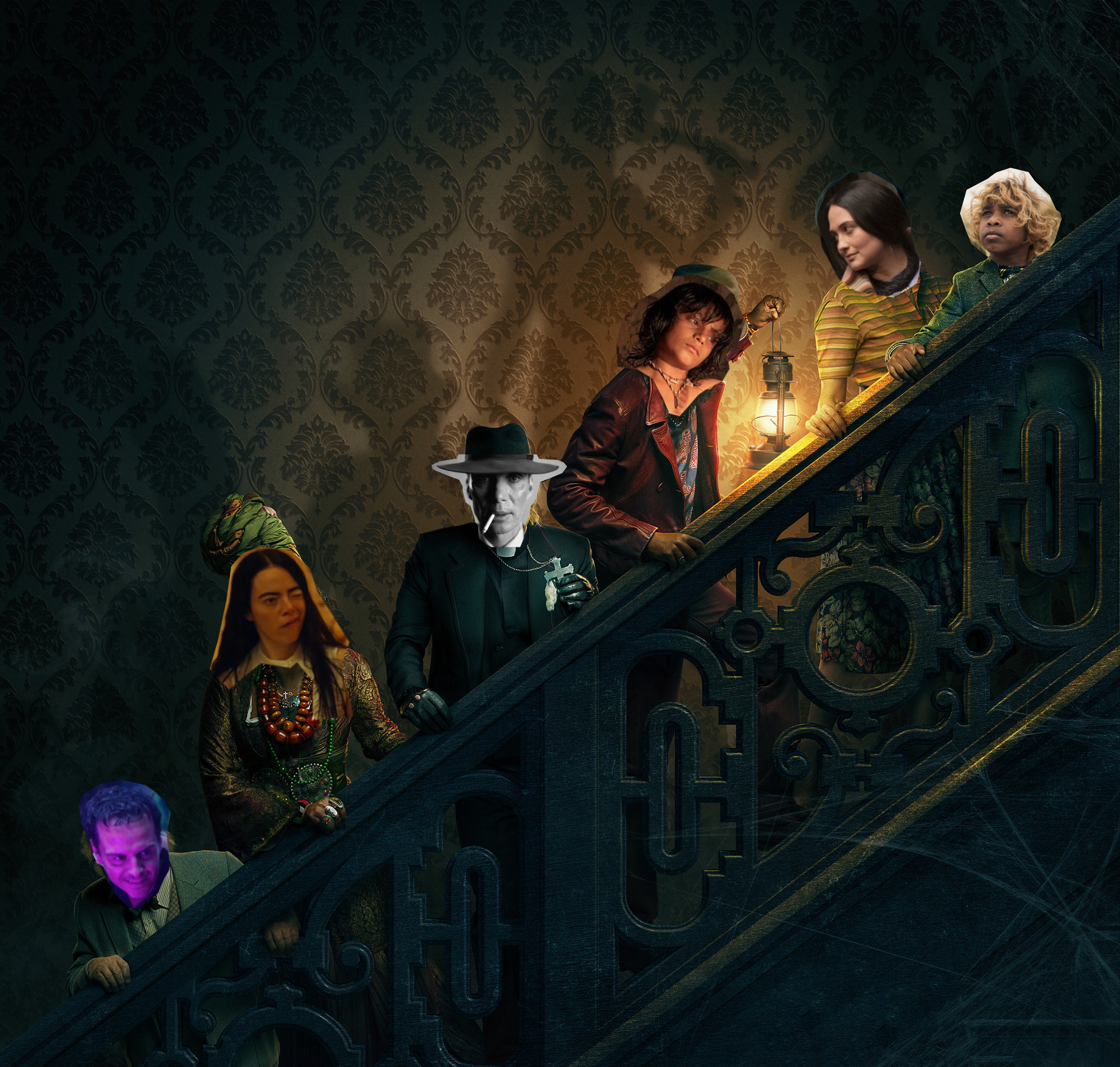
If the whole point of sharing lists of favourite films and artworks is to present a sort of mosaicked personal biography, then the list below absolutely and completely does not do that. It in no way reflects the entirely unclassifiable 2023 that I… I want to say “enjoyed”, but that’s not entirely accurate. Let’s say experienced. When I track the films I watched over the moments I lived, I find zero correlation. No pattern. A dearth of parallels. And I don’t really want to get into the personal, so telling you about the films I saw is the preferable route.
Speaking of routes, I spent much of this year visiting the world’s largest movie theme park – America – and over the course of about six months visited every state in the union, beginning with Hawaii and finishing with Alaska, and driving 21,000 miles (or 33,600 kilometres) around the remaining forty-eight states. Plus a bit of Canada.
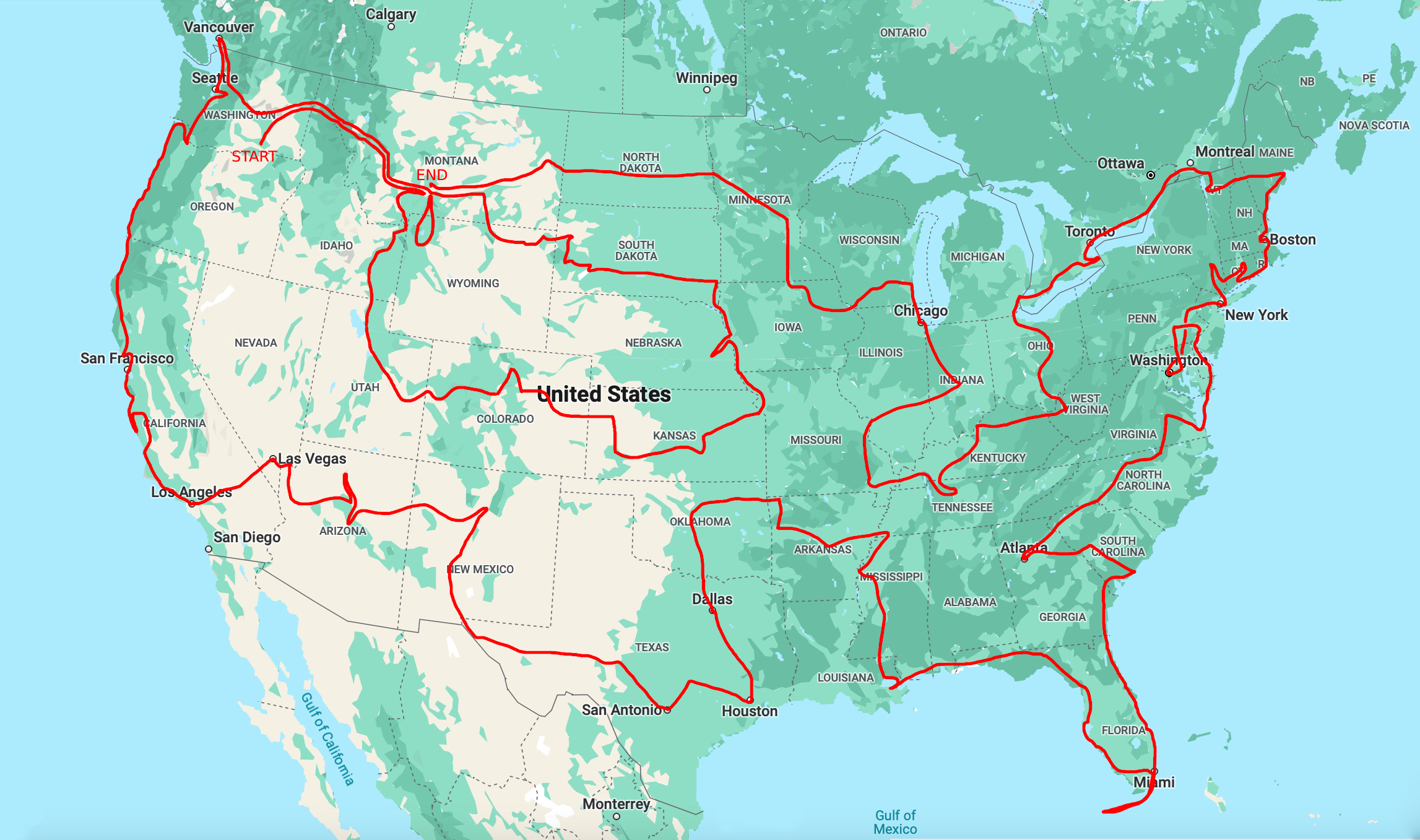
But this isn’t about the trip. This is about the films watched on the trip (and either side of it). As far as my stateside cinema experience went, I saw Ant-Man and the Wasp: Quantumania in Honolulu to kill time between my hotel checkout and my flight to the mainland; I caught a screening of Guardians of the Galaxy vol. III at a theatre in northern Oregon with Ozploitation legend Brian Trenchard-Smith (we both cried at the end); I befriended two LA locals while standing in line at Quentin Tarantino’s New Beverly to see a Mother’s Day screening of Aliens (theatrical cut), preceded by the 1962 Looney Tunes short Mother Was a Rooster, both projected on proper film; I felt pretty chuffed attending a proper Hollywood preview screening of You Hurt My Feelings at the invitation of the director; I squeezed in a session of Spider-man: Across the Spider-verse in Florida just down the road from the Kennedy Space Centre; I continued the self-defeating superhero FOMO run in Manhattan with The Flash at the Regal on 42nd Street; and I capped it all off with the new Indiana Jones in Indiana, and the punctuationally-fraught Mission: Impossible – Dead Reckoning, Part One in Edina, Minnesota. That last one obviously not as satisfying as Indiana in Indiana, but the title does anagram to Spoiler: Grim Spies Do Beckon – Edina, Minnesota, so, y’know. There’s that.
There was a request a while back for me to incorporate best first-time retro watches into this annual wrap, so here are the older films that impressed me most. Unless you’re skimming, you’ll notice the list is dominated by films from 1969, for reasons I can’t be bothered going into here, but for those with long memories or the ability to scroll, the prevalence of ’69 films (nice) is entirely due to prep work for that game I mentioned last year.
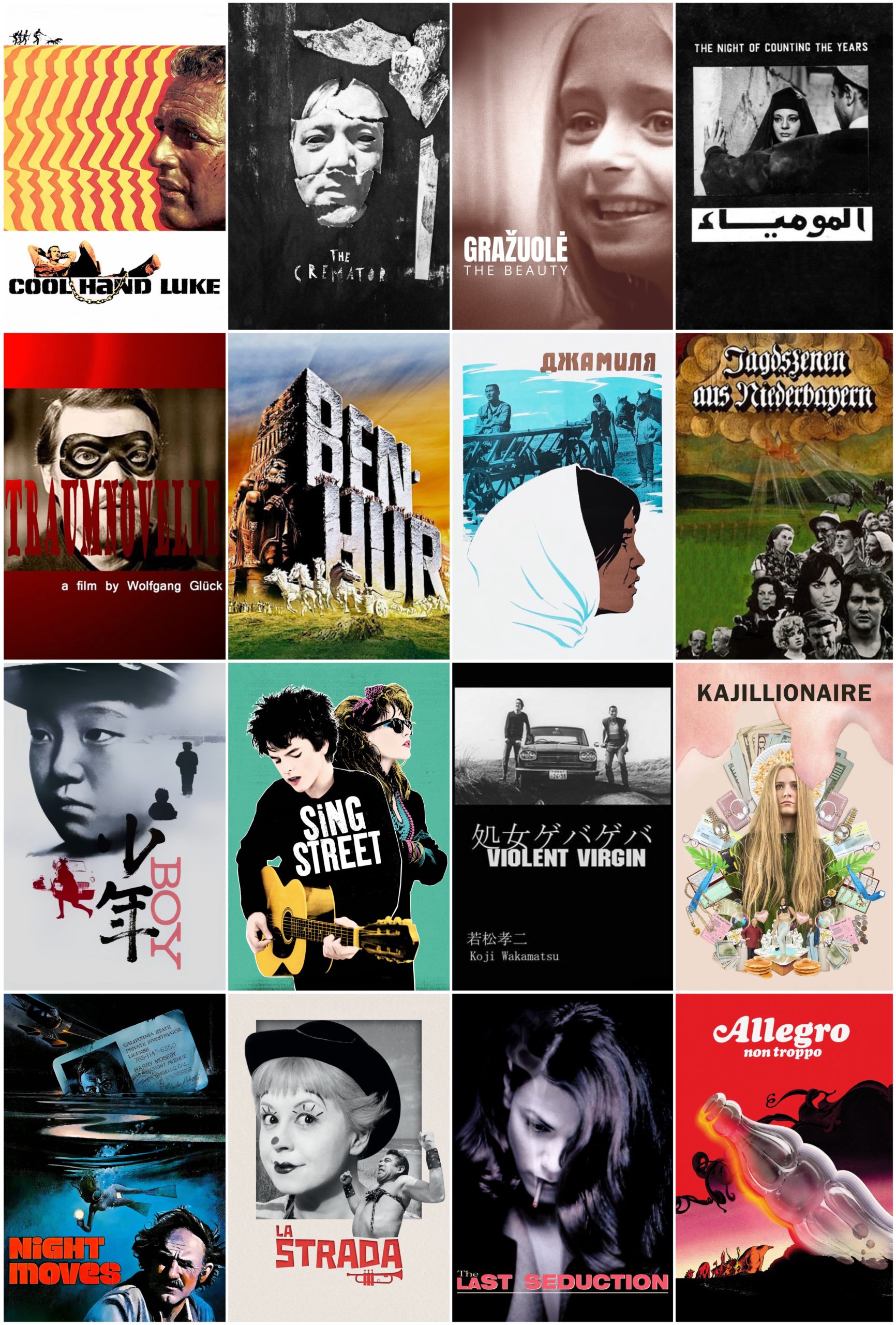
Cool Hand Luke (1967), The Cremator (1969), The Beauty (aka The Beautiful Girl) (1969), The Night of Counting the Years (1969), Traumnovelle (1969), Ben-Hur (1957), Dzhamilya (1969), Hunting Scenes From Bavaria (1969), Boy (1969), Sing Street (2016), Violent Virgin (1969), Kajillionaire (2020), Night Moves (1975), La Strada (1954), The Last Seduction (1994), Allegro Non Troppo (1976).
As always, my anarchic approach to release dates means you’re going to see a mix of this year’s films, last year’s films that only made a local release this year, and a few of next year’s films I managed to catch early, their official release dates entirely dependent on which country you’re in. Don’t think too hard about it.
Despite best efforts, there are some conspicuous absentees. I don’t know if these would have necessarily made the list or not, but a mix of circumstance and availability meant I was unable to see the likes of Nuri Bilge Ceylan’s About Dry Grasses, Cord Jefferson’s American Fiction, Aki Kaurismäki’s Fallen Leaves, Takashi Yamazaki’s Godzilla Minus One, Goran Stolevski’s Housekeeping For Beginners, Vera Drew’s The People’s Joker, Noora Niasari’s Shayda, Tran Anh Hung’s The Taste of Things, or about half of what’s on John Waters’s always-essential wrap. The full list of what I actually did see – including your favourite film, which I did not care for – is included below.
Among the films I did catch were some achingly close best-of near-misses, including Carla Simón’s Catalonian saga Alcarràs, Wim Wenders’s dreamlike documentary Anselm, Felix Van Groeningen and Charlotte Vandermeersch’s alpine story of friendship The Eight Mountains, John Carney’s triumphant musical-comedy-drama Flora and Son, Todd Haynes’s bold dark comedy May December, Hirokazu Kore-eda’s beautifully complex Monster, Jafar Panahi’s latest reality-blurring act of defiance No Bears, Sam Esmail’s razor-sharp apocalyptic drama Leave the World Behind, Tina Slatter’s inspired biographical drama Reality, and Kelly Reichardt’s relentless and moving Showing Up. And if those ten films had been the ones to comprise my final list, I’d have considered it a pretty great year, which should indicate how much I loved the below.
Preambulation complete. On with the show.

12. Poor Things
As the brief-but-bright shared universe phenomenon begins to fade, the desire to identify and forge connection lingers, and both artistically and thematically I found it impossible not to draw a direct line from Jean-Pierre Jeunet and Marc Caro’s The City of Lost Children to Poor Things. It’s not just that both embrace a steampunk art nouveau aesthetic, where the science and architecture of the industrial age has moved beyond the confines of its epoch; it’s also the ideas those concepts ignite. If steampunk is all about the past advancing at an expedited rate, it makes sense that both films should feature characters who are essentially children trapped in adult bodies, sexuality and physical strength accelerated beyond what the minds inside are mature enough to handle. And yet Emma Stone’s Bella seems to have a greater handle on how the world works, or should work, than anyone around her. It’s a modern Bride of Frankenstein, the creation rejecting the intention of the creator, but here taking control of her own destiny. The journey she goes on is so surprising, so truly epic, that the only thing I’m baffled by is the title: Poor Things feels like it belongs to a smaller film with scope nowhere as sweeping or ambitious as Yorgos Lanthimos and Tony McNamara’s extraordinary fantasy. By the film’s end, when the lines between familial identity and romantic partners have blurred like the lines between the bifurcated animal hybrids that wander the grounds, those big themes crash gloriously into one another, and propel this from a stylistic wonder into something far more profound.
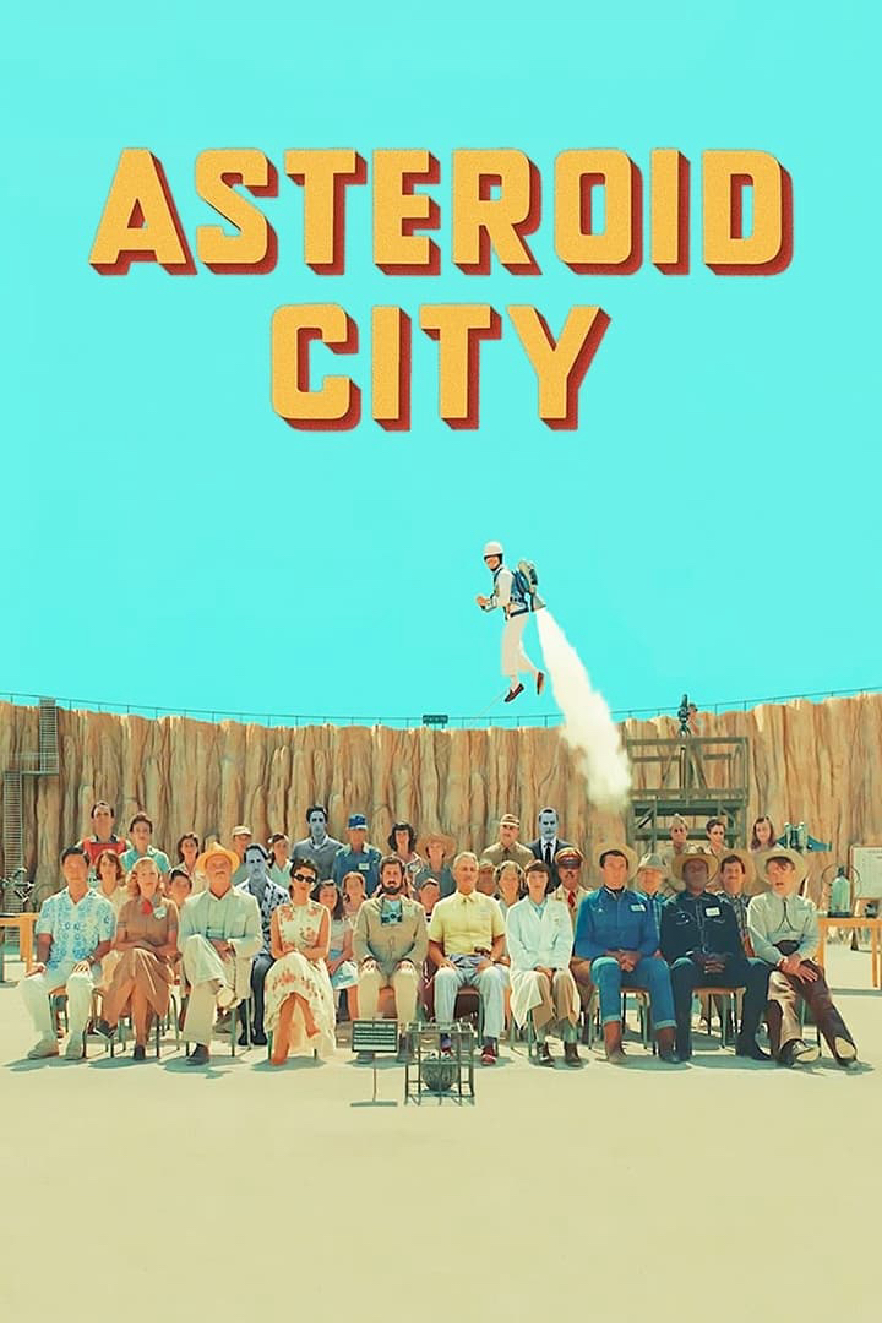
11. Asteroid City
In what is fast becoming one of my favourite films of the 21st century, 2019’s The Vast of Night features a small 1950s US town that may or may not be have been visited by extra-terrestrials. It’s a film consciously framed by a fourth-wall-breaking Rod Serling-like narrative device, one that’s not a million miles away from the one Wes Anderson employs in his own tale of ’50s alien visitation. But what Anderson does here is more layered: there is a Serling-type, but here he seems to be narrating a play, except it’s presented to us like a film, and we see theatrical recreations of its inception and rehearsals. It’s hard to identify which reality we should be grounded in, and in many instances the film feels like it’s trying to push us away, the cleverness and self-awareness holding the emotions at bay. But because every moment of Asteroid City is knowing and even a bit Brechtian, the presentation is the point. More importantly, it’s his funniest film in years. Nobody deconstructs language like it’s the victim of awkward mistranslation like Wes Anderson. He is often derided for his rosy storybook nostalgia, but cinema is supposed to be fanciful and transportative, and his brand – doused in laundered aesthetics and completely stripped of the mundanity of the real world – remains as healthy as it is appealing. And really, there’s no one better placed to recreate the 1950s world of ray guns and bubble helmets and jet packs and alien landings. (Well, maybe Tim Burton, but he’s had a go.) I fear the day I’m no longer delighted by these pretentions: a train, apparently in miniature, zooms past painted backdrops; a man smoking a pipe bends sideways out a window to look at what is seemingly a hand-crafted nuclear explosion. At a time when cinema feels visually muted and digitally gauzy, Anderson’s overt colour schemes and parallel lines are an oasis of character. Which is why I very nearly combined this entry with these four works:
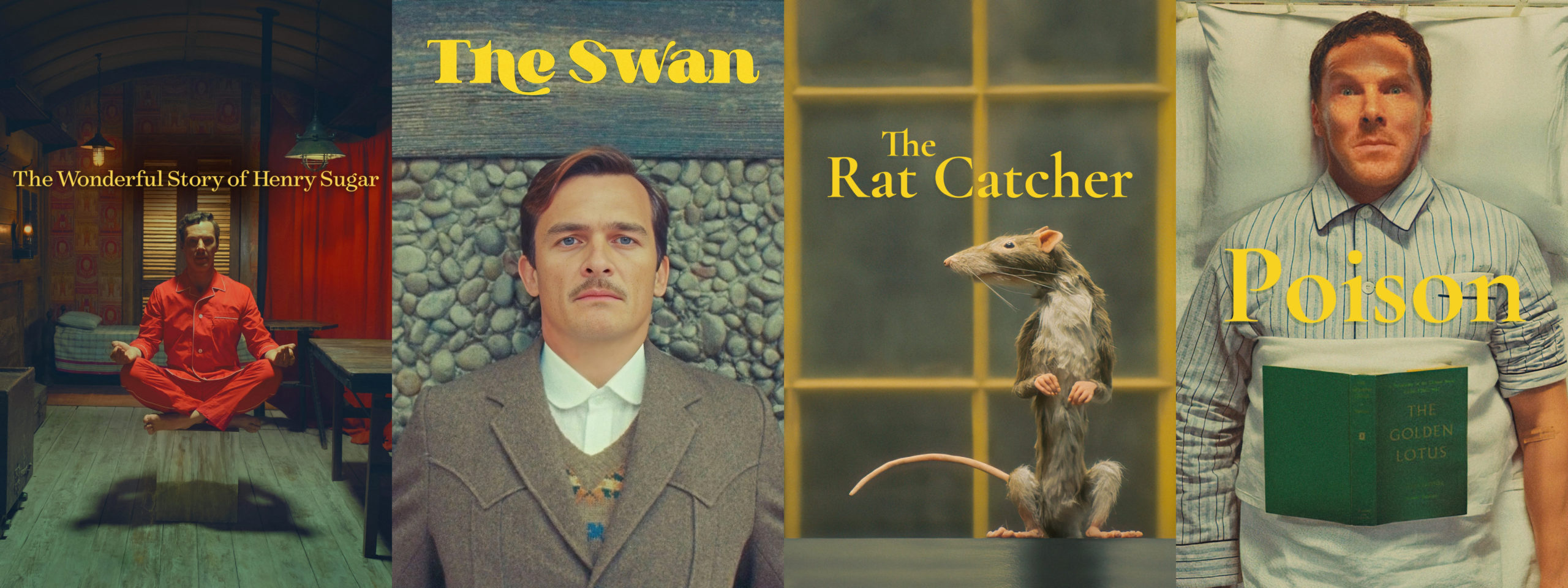
Returning to the works of Roald Dahl, Anderson adapted and directed four short stories as short films, released by Netflix. All four are as beautiful and compelling as Asteroid City, and rank among the best and most original works I saw all year. It’s telling that many AI proponents seem so fixated on recreations and parodies of Anderson’s style, given his distinct artistry is about as far from computer-driven artificial intelligence as you can get.
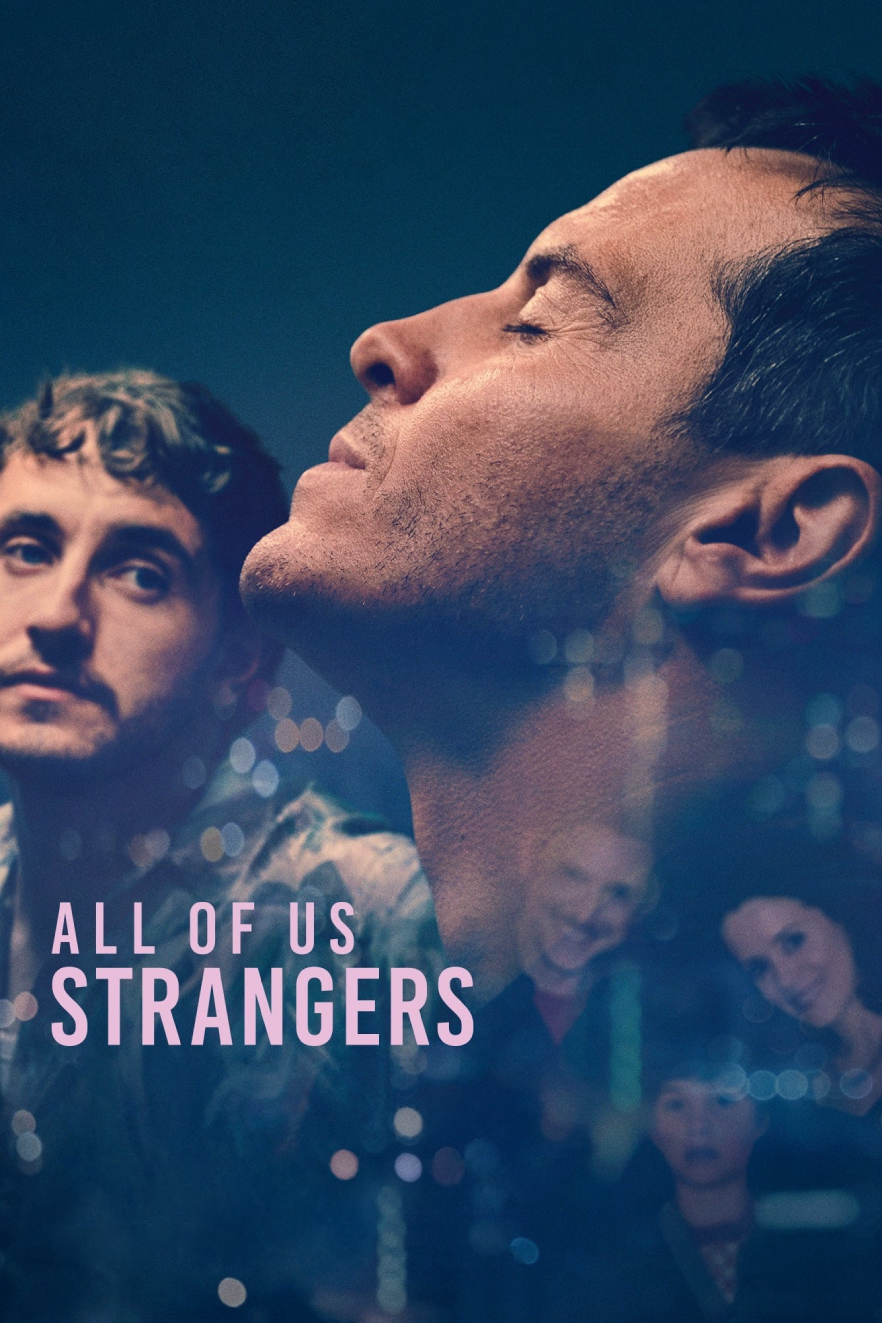 10. All Of Us Strangers
10. All Of Us Strangers
The fantastic is never more fantastic than when it’s intruding on real life, our own reality augmented with something supernatural. The tonal highwire act between reality and fantasy is a difficult one to walk – are there literal rules, or is it dream logic? – but here, writer/director Andrew Haigh does not falter, thanks largely to the fact that he never seems remotely ashamed or embarrassed by the potentially-supernatural elements. A lonely man meets and falls in love with the only other resident of his apartment building, as he finds himself suddenly able to travel back to his childhood home to visit his long-dead parents, both suspended in time and apparently now younger than him. Andrew Scott and Paul Mescal have such undeniable chemistry, the two absolutely ranking among the greatest romantic pairings. The ending initially jolted me, almost pulling me out of the film, but as the thesis of the piece became clear, it’s obvious the resolution is the right one.
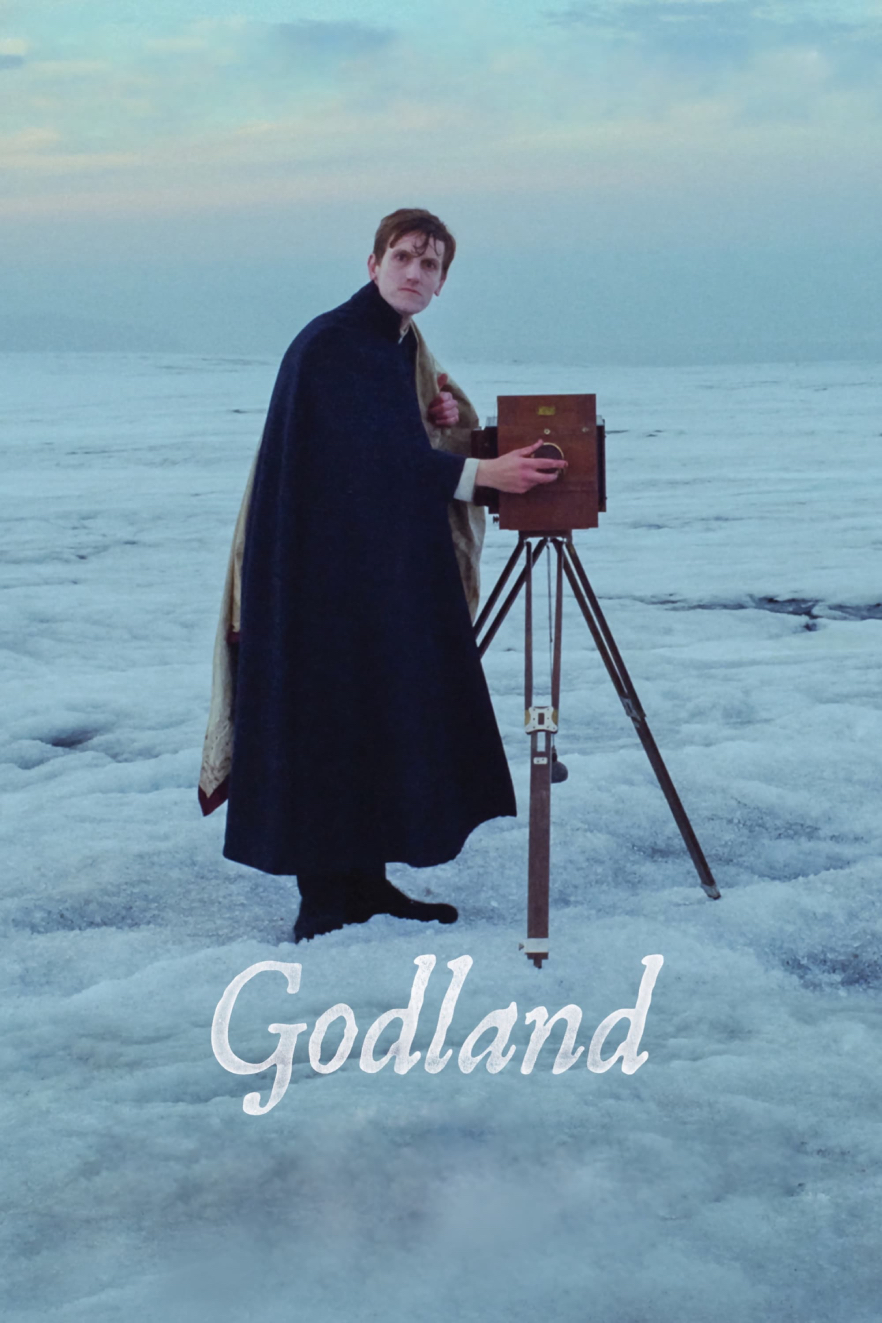 9. Godland
9. Godland
In the 19th century, a Danish priest travels across Iceland in order to build a church in a remote coastal settlement. He is bringing God to the people, but his concept of God is narrow and inflexible, one that bears little relevance to the lives of those on the edge of the world. Priest Lucas has a romantic notion of Iceland that never quite matches the reality, and he quickly comes to view the landscape as an impediment, a brutality to overcome. His passion is photography, and the only time he can appreciate the beauty of the world around him is when he is cocooned within a dark room, viewing it through the artificiality of the still image. The film, like the people, sees the country’s true beauty, and sees God in nature; it’s only Lucas who is blind to it. He refuses to perform a wedding ceremony because the church building is unfinished, and nature is seeping offensively through. But the land itself is God, and all judgments come at its hand.
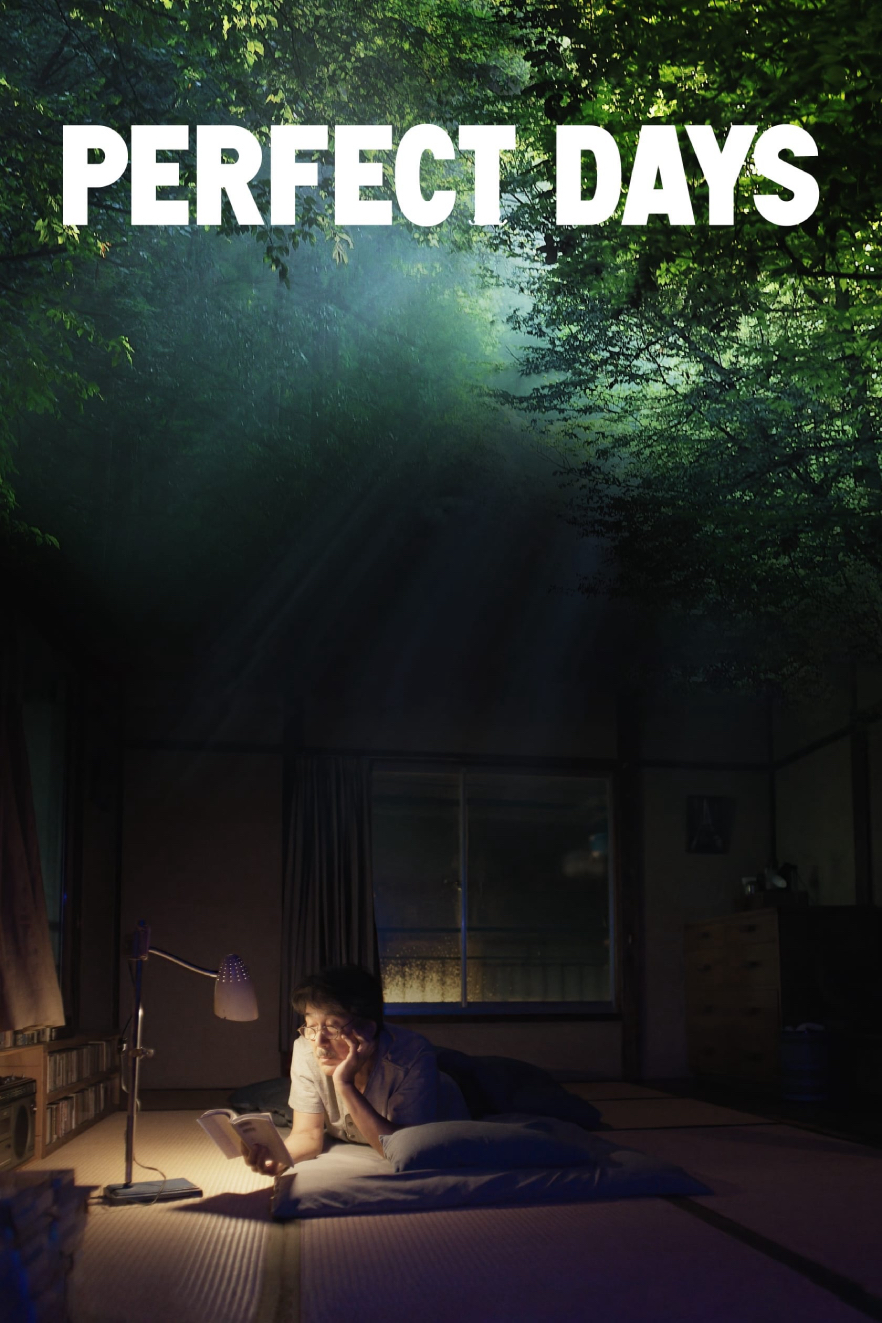
8. Perfect Days
A gentle Japanese man works as a public toilet cleaner and wakes up every day in love with the mere concept of life. He finds beauty in the small moments: appreciating his annoying, irresponsible assistant when he shows kindness to an autistic man; engaging in a game of noughts and crosses an unseen person leaves for him to play. He gazes up at the urban canopy and tries to capture it on film. They are small moments lost in time, enjoyed only by him. It’s an alternate universe version of Amelie, its own idea of beauty much more restrained, but no less effective. There is sadness in his life: the hint of an estranged father, a suggestion he has turned away from his wealthy family in favour of a simpler life. The film is divided into chapters, and just as we’re starting to think he may be a magical force who will transform the lives of others, we begin to be let into his: the family trauma, the unspoken desire for a woman who runs a local restaurant, which itself leads him to her ex-husband and the unexpected connection they forge. It is one of the more quietly beautiful films of the year, its final moments gently devastating. Wim Wenders is one of the all-time greats, and Kōji Yakusho is perfectly cast, possessing an expressive beguiling face you’re happy to spend two hours gazing at.
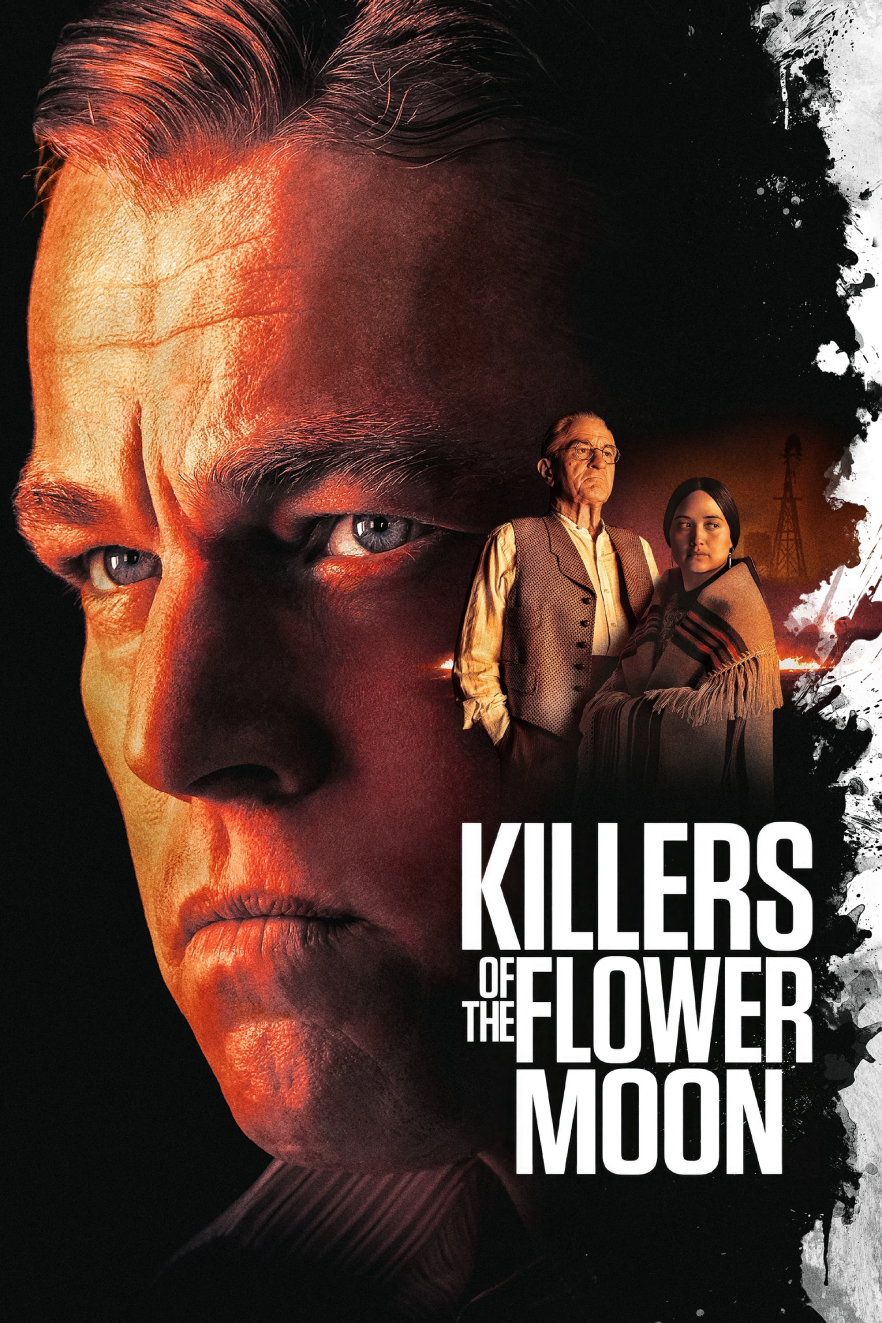
7. Killers of the Flower Moon
The most shocking moment in this film wasn’t the violence. I was prepared for that, it is a Martin Scorsese film after all. No, the most shocking moment came at the end, the moment that threw everyone, the sudden cut to years later, where the events of the film are now dramatised as a radio play. What was once very present is now distant, a past smoothed and presented as entertainment, sanitised and replete with product placement. That Scorsese himself takes a role in this charade ranks amongst the savviest choices he’s made, a meta commentary on his own role as storyteller. It’s a warning against his own techniques in depicting the reality of the murders: no matter how effective or affecting, no matter how grounded in the cruel mundanity of reality, they are still filmmaking techniques designed for entertainment, and he is reminding us that these are real people. This particular iteration of the Osage murders could only have been made today. Only in a post-Trump world could we truly appreciate the self-justification of the venal and monstrous, believe it en masse without it coming across as cartoon villainy. The casually horrific conversations between De Niro and DiCaprio demonstrate how the villainous can remain convinced of their own virtue. But the real story is told in the visage of Lily Gladstone. There’s little question she is the centre of the film, not just because she is the human face in a story of inhumanity, but because of her raw screen presence. The camera is drawn to her poise and manner in every shot; she is wary but willing, aloof but allured, clever enough to know who not to trust, but still unable to comprehend the depth of depravity within the one she trusts the most. When people say she steals the film, it’s absolutely true. And if she didn’t, it would be a very, very different beast. Scorsese – by many metrics the greatest filmmaker of all time – has become more thoughtful with time, and that thoughtfulness has made him all the more commanding. This is the same Scorsese that made Silence, and whose understanding of human nature is taking him to places few filmmakers are able to explore with such skill.
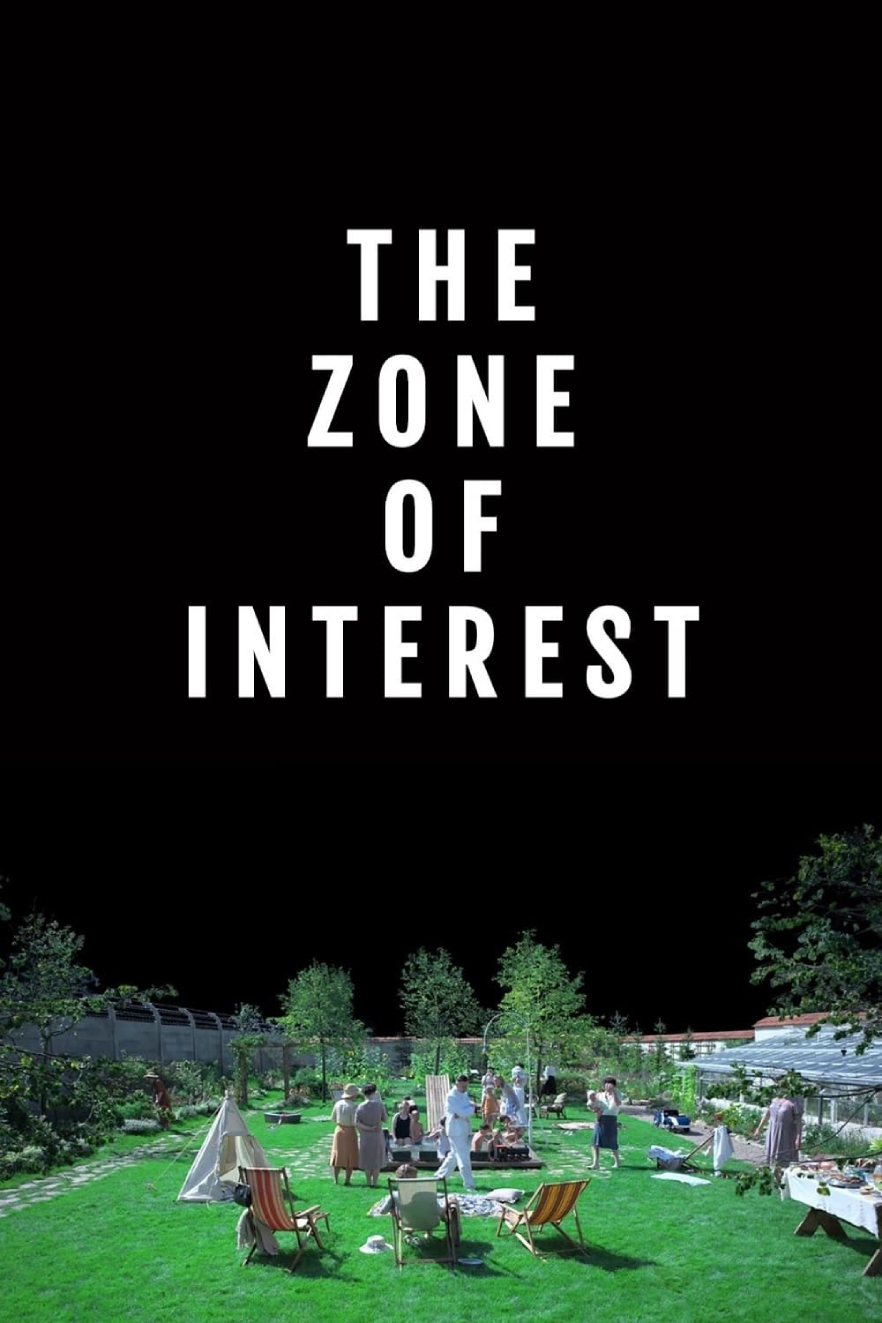 6. The Zone of Interest
6. The Zone of Interest
Only last year I declared no film has rendered Hannah Arendt’s concept of the banality of evil as effectively as Jasmila Žbanić’s Bosnian massacre drama Quo Vadis, Aida?, but Jonathan Glazer’s The Zone of Interest gives it a real run. The film follows Auschwitz commander Rudolf Höss and his family, living in a beautiful compound right beside the concentration camp. Here, evil could not be more banal: it is the minutiae of everyday life, the details of childhood and domesticity, where the horrors of the Shoah are literally on the other side of the wall, always heard, sometimes glimpsed, rarely addressed. In fact, the less Glazer addresses it, the more terrifying it becomes. By ignoring it, he forces us to ignore it, and we become complicit. In that sense, it’s the most pertinent film about real-life horrors, about every modern conflict happening right now, on the other side of the wall until it isn’t, easy to disregard until it isn’t. The one character for whom the horror is too great is dealt with in silence – a sudden absence, a missing suitcase, a made bed, and a single note that’s quickly disposed of in a furnace. The metaphor is almost too much to bear. Höss’s disgusted mother-in-law seems like the voice of conscious in this moment, the good person who refuses to be party to the carnage, but earlier she hopefully speculates whether her former boss is in the camp. She seems fine with what’s happening up to a point. That she even has a line to cross is perhaps more damning in its nuance than a wholesale demonstration of dehumanisation. But it’s the final denouement that drives the point home: a glimpse into how history will remember, well-meaning but also somehow complicit in its banality, because we can only ever memorialise from a palatable distance. There is a symbolic descent into hell for one of the most monstrous humans in an ocean of monstrosity, capping off what is one of the finest and most effective films about the Holocaust ever made.
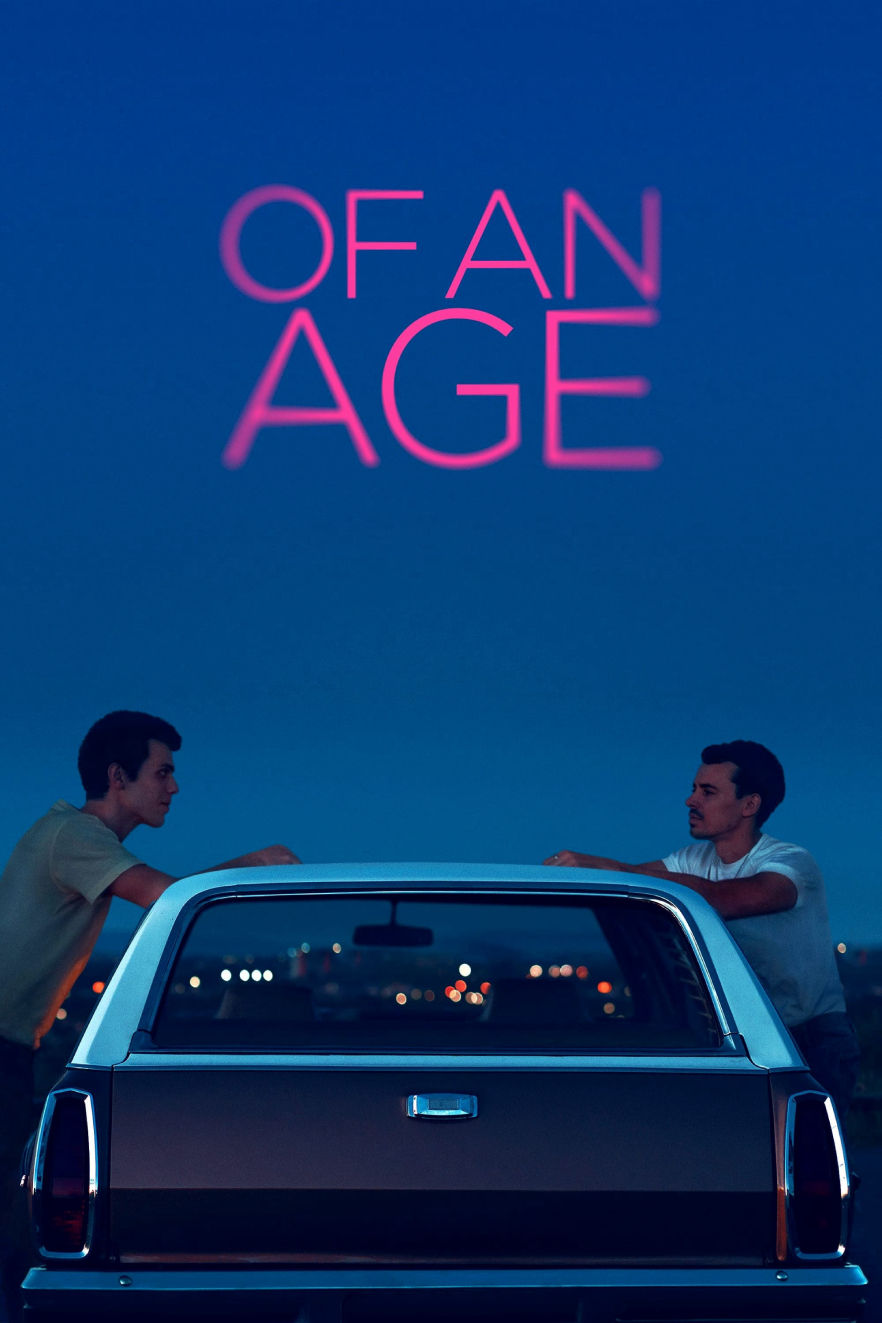 5. Of An Age
5. Of An Age
Goran Stolevski, surely Australia’s most exciting new filmmaker, delivers a film a million miles away from his feature debut You Won’t Be Alone. Or, more literally, ten thousand miles away given You Won’t Be Alone is a horror fantasy set in 19th century Macedonia, and Of An Age is a romantic queer coming-of-age film set in the glory of 1990s Melbourne. Stolevski destroys almost every negative stereotype about Australian films in this gentle masterpiece: every single moment, line, and performance is authentically natural, and instead of miring us in the easy crutches of misery and tragedy, the film is steeped in charisma and humour. The teens act like teens, hormonal and impulsive and shy and passionate, and there’s not a moment in the love story between the Serbian-born amateur ballroom dancer and his dance partner’s older brother that doesn’t ring wonderfully, beautifully true.
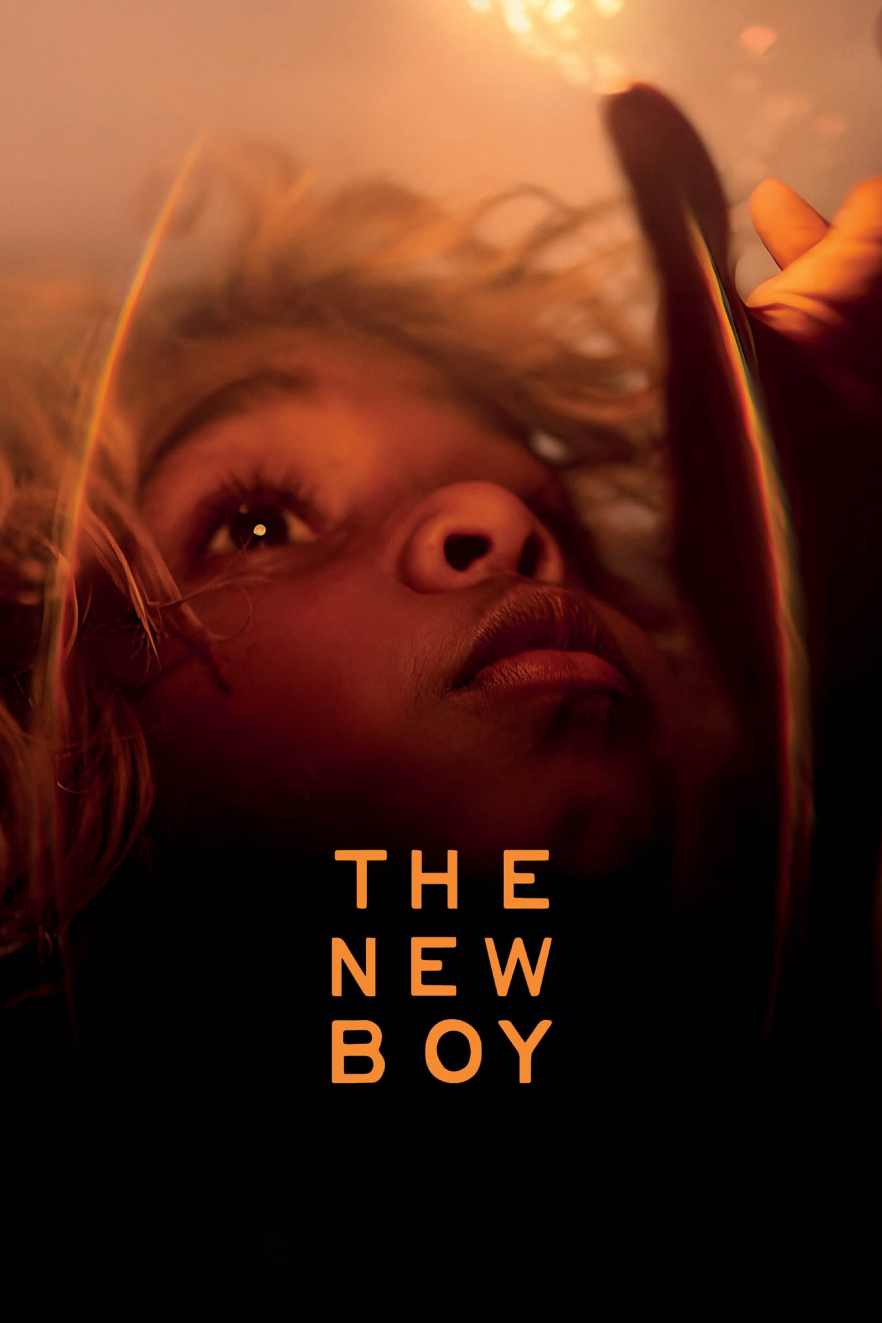 4. The New Boy
4. The New Boy
In the best opening of any film this year, and perhaps most other years, an unnamed Aboriginal boy battles with a white soldier. In the dust of the desert, he fights tooth-and-nail with the coloniser: he is small, overwhelmed in size by his opponent, but had somehow gained the upper hand. In the midst of the fight, horse hooves plough the red sands as backup approaches; the future is coming for the boy. As he makes his escape, it is an Aboriginal man in western clothing who brings him down: not the white man, but the boy’s own destiny, the inevitability of assimilation. The incredible score by Nick Cave and Warren Ellis plays into this, the incongruous orchestral strings at odds with the raw landscape. Warwick Thornton’s colonial elegy is a thing of beauty, his use of magic realism no less bold than his skilful restraint: I can’t shake the image of the titular new boy with a jagged bottle of wine, juxtaposed with the reflection of those rushing to help the injured returning from a fire. The boy’s magic is misunderstood by those around him, feared or misinterpreted. Cate Blanchett’s nun is the perfect foil, an empathetic, hopeful figure unaware she is the antagonist in the boy’s story. But Aswan Reid is the real discovery here, charismatic and measured, and perfectly filmed by Thornton, who also serves as cinematographer. From the opening through to the final moments, this is a film of utter beauty, featuring perhaps the best score in years, and is likely Thornton’s masterpiece.
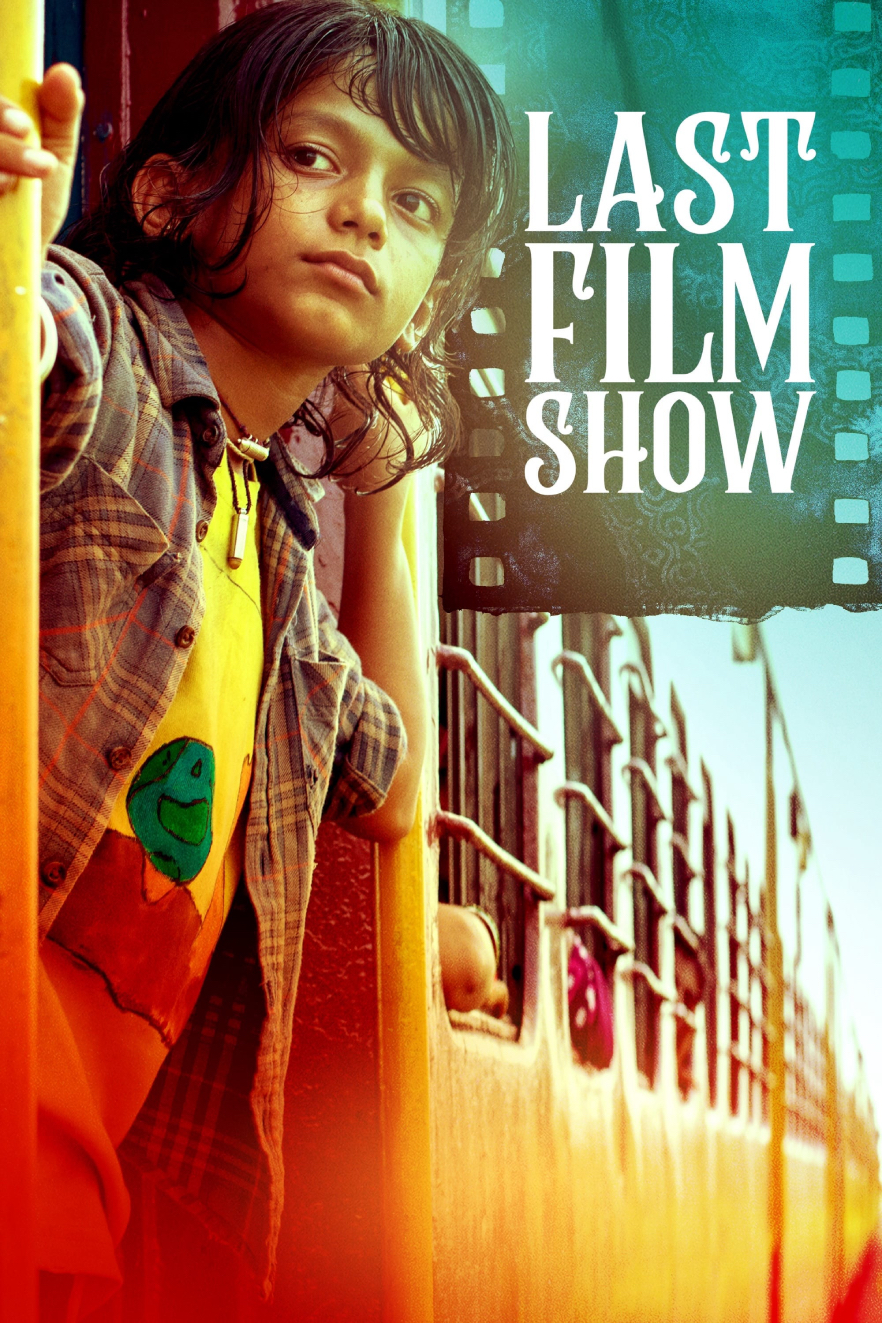 3. Last Film Show
3. Last Film Show
There is nobody in the history of film, not Sammy Fabelman or Cinema Paradiso’s Salvatore, who loves cinema as much as nine-year-old Samay. It is a pure, intense love that cannot be thwarted by parental disapproval or the anger of cinema managers or the demands of school; he is bloody single-minded in his pursuit of the moving image. The same can be said of writer/director Pan Nalin: there is a sequence partway through the film that is truly breathtakingly. It is a moment of evolution and devolution, a look at the life cycle of film equipment once the medium is devalued; a stark vision of the future, heartbreaking but graceful, as Samay moves invisibly through spaces like the angels in Wings of Desire. Only he sees the truth of what’s happening beneath the assembly line, the loss and brutality, and so only he can later come to appreciate the beauty of it. Last Film Show is an impossibly sweet film, in love with the possibility and magic of cinema, phrases that have been degraded by their facile usage in award ceremony voice overs and festival copy. But here it is, new again, and through the eyes of Samay it is impossible not to love.
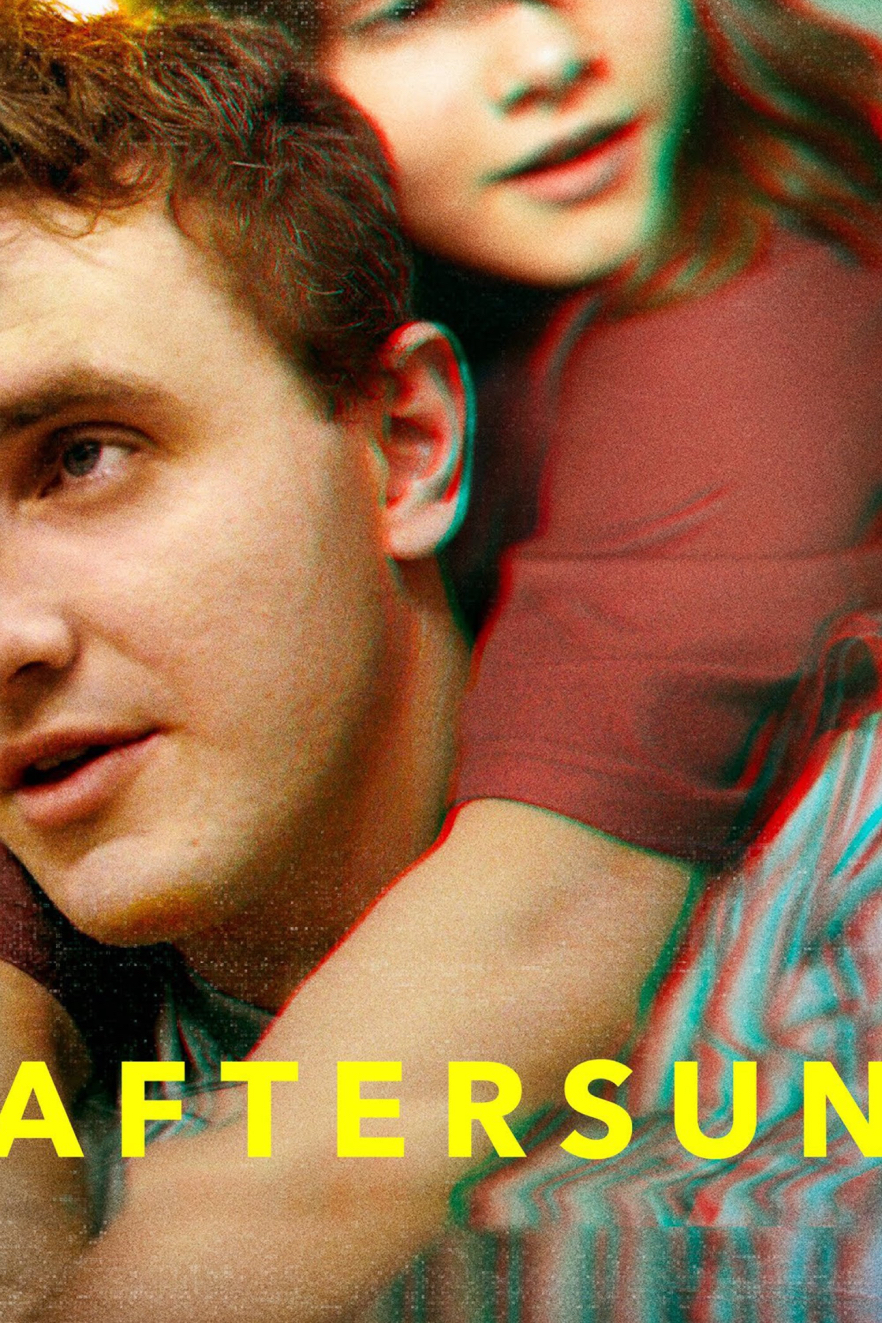 2. Aftersun
2. Aftersun
Released in Australia this February was the film that flooded so many of last year’s best-of lists, a film I’d spent so long searching for and only ended up watching on a connecting flight from Honolulu to Denver. And even in that setting, the image squashed into the LED screen on the back of the seat in front, or possibly on my phone via the airline’s in-flight entertainment app, I forget which, the film still reduced me to a mess of tears. Grief permeates this thing, writer/director Charlotte Wells expertly tugging at expectations like a marionette. The film is built on a feeling of apprehension: we sense something dangerous will soon happen, and so any moment where the possibility arises is met with dread. So much is left unsaid, the film living just under the surface… but to describe what’s happening underneath feels misleading, as if confusing interpretation with intent, and yet to take the opposite route and simply describe the literal beats and actions feels dishonest. In a literal sense, the film almost defies description. Flashforwards hint at an outcome, and we forensically study the facial emotions like clues, trying to ascertain the nature of the offence. Paul Mescal’s Calum is someone trying to break a cycle of pain and bad parenting, and is an attentive and caring father to his daughter. But we can see the pain creeping in through the cracks, his reaction to a birthday song, unimaginable grief that can surely only lead to one place. We know the cycle is not broken, and that the pain will continue to the next generation. Wells directs her debut feature with the confidence of someone ten films deep, every choice she makes paying dividends, her aim so deft it can hit you through a low-res six-inch screen thousands of feet in the air.
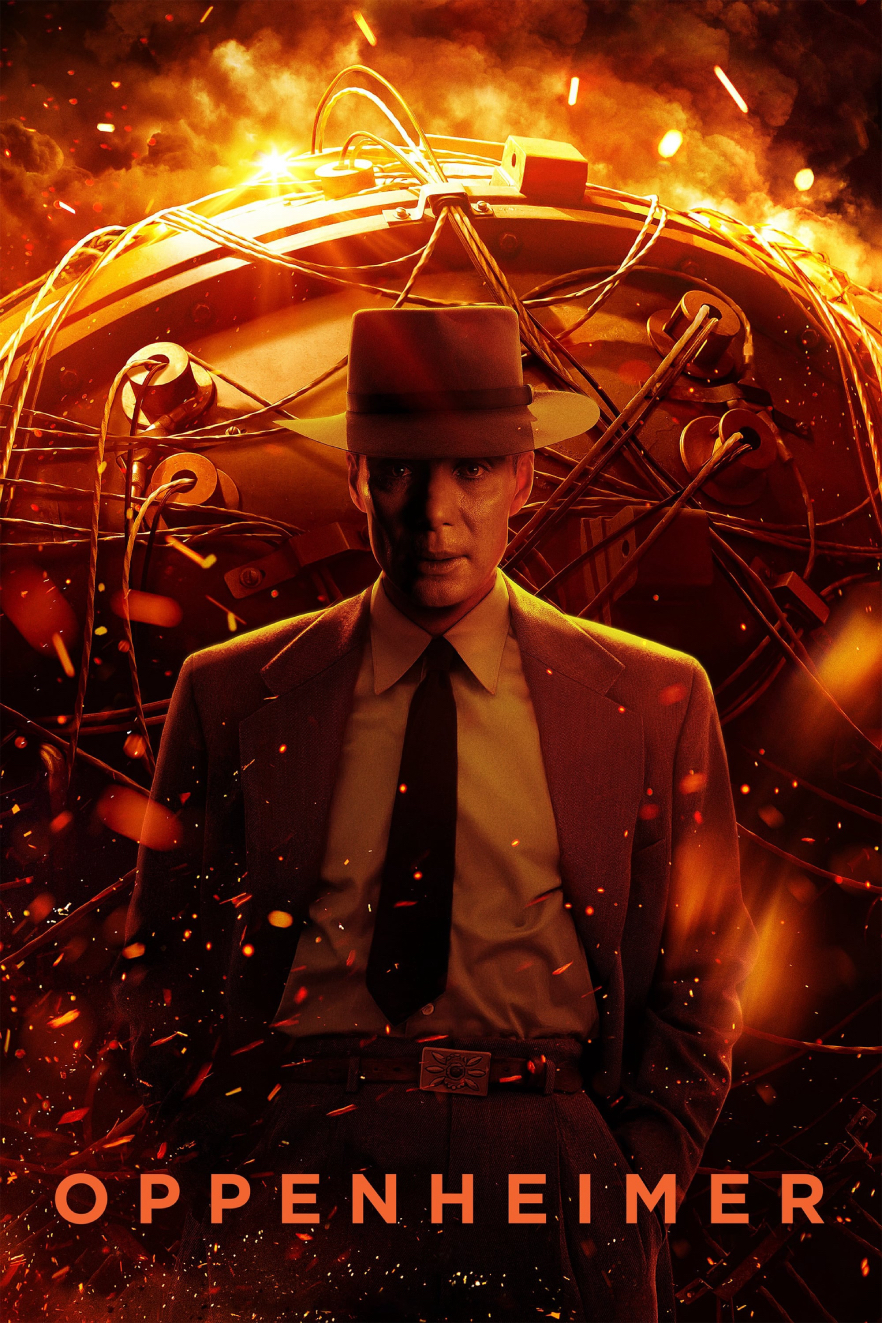 1. Oppenheimer
1. Oppenheimer
It’s pretty fitting that my own countdown should end with a film effectively constructed as a countdown, a three-hour film paced like the ticking second hand of a clock.
There’s an energy that comes at the end of The Usual Suspects (1995) that felt, at the time, like something entirely new. It’s not like the film invented the montage – to borrow a phrase from Isaac Newton, one of the few scientific figures to not cameo in Oppenheimer, whatever heights it reached came from standing on the shoulders of giants – but what it delivered was seminal, a moment that undeniably changed my own cinephilic DNA. So, like the classic imitation of the idiot who wonders why they can’t just make the whole plane out of the indestructible black box, I’ve always wondered whether you could make a whole film out of that montage. Cinema is all about the careful balancing of pace, so could an entire film sustain that level of energy without exhausting the audience?
Oppenheimer tests this, but it’s not just an exercise in style; here, the medium is the message. As enthralled as I was by the film, I spent most of it half-consciously searching for the central premise. Is it about power run amuck? Warnings not heeded? The dangers of hubris? The greater good and necessity of evil? I worried Oppenheimer the man was too distant, and when Edward Teller says nobody knows what he stands for, and asks him if even he knows, I wondered if this was the film lampshading its lack of character development. Could a filmmaker as deft as Nolan be so clumsy? The answer, thankfully, is no.
Because Oppenheimer being single-minded in his search for the end of the equation is the point of the film. The raw energy of atomic power is the raw energy of the film, there’s no time or space for a downbeat. We are ticking ever onwards. The fact that this unrelenting motion remains so perfectly paced is a marvel, because you should not be able to sustain three hours on that kind of uneasy, unabating montage… yet it works because Nolan knows when to gently release the pressure without ever losing that sense of inevitability. And it was only at the end that I clocked what the film actually was: a gigantic countdown.
Months before the film’s release, a promotional youtube video played a short teaser on loop, with a countdown to the film’s release date. What seemed like little more than a catchy marketing concept was actually so much more. It was subtly forecasting the whole premise of the film.
Oppenheimer the man believes is that a display of this massive atomic power will usher an age of peace, and the revelation of what is actually happening comes at the start, in the middle, at the end. Linear time is fractured by the bomb, and so are the realisations and revelations. First, we are counting down to the development of the theory, then to the first successful test, then to the bomb being dropped, then to the end of the war, then to a confirmation hearing, to a security clearance, to a public redemption, to an award. It goes on forever. The endless explosions that never quiet the ticking clock.
Nolan’s thesis is that no bomb can ever stop war. No countdown ever actually ends. There’s always another one at the ready. And for a work that could have relied on the human devastation and personal regret to carry the burden of meaning, this is an extraordinary premise on which to hang a film. There are so many ways in which to tell the story of the futility of war, and I can’t recall one that has told this specific message, in this specific way. Nolan knows full well that we in the present understand the atomic bomb doesn’t end wars, and works just as hard to place us in the shoes of the men who believed it would, before revealing that which we already know. It’s an impossibly difficult thread to weave, and impossibly effective.
It could have easily been such a formal film, and so staid in the importance of its subject, yet the work is borderline experimental. Nolan is as innovative here as he’s ever been, and the way in which the power of the bomb invades thoughts and dialogue is astonishing. Jennifer Lame’s editing is immediately in the pantheon of great works; no one has so innovatively and counterintuitively and effectively challenged the rhythms of editing since Thelma Schoonmaker.
For my money, Oppenheimer is Nolan’s – and 2023’s – best film.
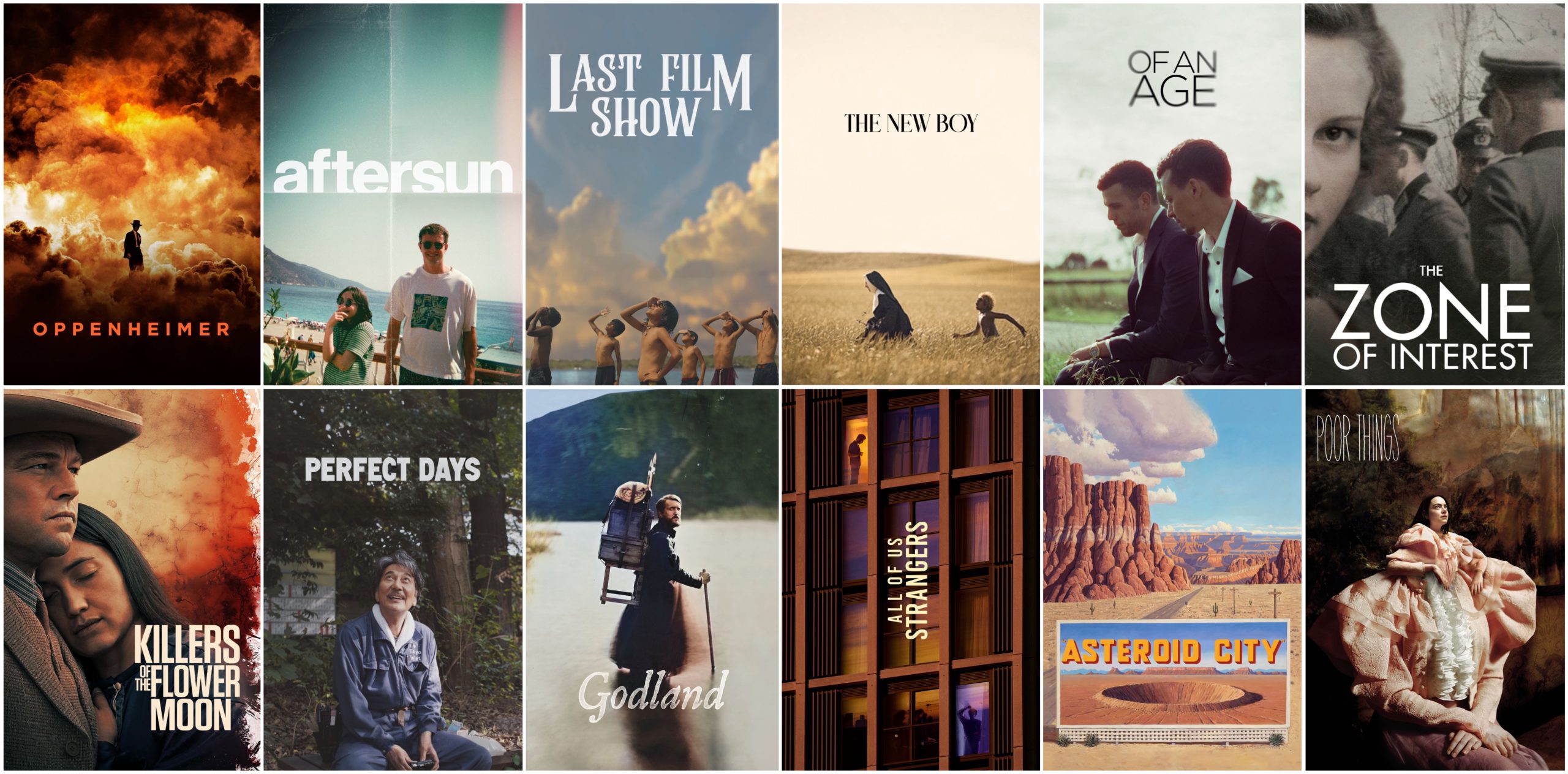
New Release Films Watched in 2023
Ant-Man and the Wasp: Quantumania, Aftersun, The Pale Blue Eye, The Strays, We Have a Ghost, Pearl, Knock at the Cabin, Infinity Pool, Unwelcome, The Whale, Empire of Light, Babylon, Women Talking, Living, The Son, Alice Darling, Marlowe, Missing, M3gan, The Old Way, Operation Fortune: Ruse de Guerre, Sharper, Cocaine Bear, Magic Mike’s Last Dance, Creed III, Tetris, Inside, Boston Strangler, 65, A Good Person, Shazam! Fury of the Gods, Hunger, Peter Pan & Wendy, Ghosted, Scream VI, Renfield, Guardians of the Galaxy vol. 3, Dungeons and Dragons: Honor Among Thieves, The Pope’s Exorcist, The Covenant, You Hurt My Feelings, Air, The Mother, Still, Paint, A Man Called Otto, Polite Society, The Super Mario Bros Movie, Reality, A Thousand and One, Jesus Revolution, Spider-man: Across the Spider-verse, Mafia Mamma, Evil Dead Rise, Beau Is Afraid, Hypnotic, The Flash, About My Father, On Sacred Ground, Flamin’ Hot, Sanctuary, Indiana Jones and the Dial of Destiny, Mission: Impossible – Dead Reckoning Part One, Asteroid City, Wham!, Plane, Run Rabbit Run, Dalíland, Fool’s Paradise, Blackberry, The Blackening, Master Gardener, Bird Box: Barcelona, Alcarràs, Of An Age, Champions, What’s Love Got To Do With It?, Perfect Days, May December, Khers nist (No Bears), Room 999, Mutiny In Heaven: The Birthday Party, The Beanie Bubble, Sisu, God is a Bullet, Organ Trail, To Catch A Killer, They Cloned Tyrone, Joy Ride, No Hard Feelings, I Used To Be Funny, Anselm, Kaibutsu (Monster), Showing Up, Theatre Camp, Squaring the Circle (The Story of Hipgnosis), Barbie, Sound of Freedom, The Unlikely Pilgrimage of Harold Fry, Oppenheimer, To End All War: Oppenheimer & the Atomic Bomb, The Last Voyage of the Demeter, The Adults, Meg 2: The Trench, Teenage Mutant Ninja Turtles: Mutant Mayhem, Elemental, Perpetrator, Limbo, Golda, The New Boy, El Conde, Talk To Me, The Boogeyman, No One Will Save You, Gran Turismo, Chevalier, Past Lives, How To Blow Up a Pipeline, Nowhere, The Burial, Fair Play, Biosphere, Killers of the Flower Moon, It Lives Inside, Totally Killer, Smoking Causes Coughing, Saw, Cuando acecha la maldad (When Evil Lurks), Anatomie d’une chute (Anatomy of a Fall), Skinamarink, Pain Hustlers, The Killer, Late Night with the Devil, A Haunting In Venice, Fingernails, Yellow Door: ‘90s Lo-fi Film Club, Rock Hudson: All That Heaven Allowed, Blue Beetle, The Marvels, Jawan, Nyad, Jules, Chhello Show (Last Film Show), Coup de Chance, Napoleon, Carmen, Foe, The Creator, Le otto montagne (The Eight Mountains), Albert Brooks: Defending My Life, Rotting in the Sun, Vanskabte land (Godland), Roter Himmel (Afire), The Zone of Interest, American Symphony, Priscilla, The Holdovers, La memoria infinita (The Eternal Memory), The Eternal Daughter, Flora and Son, Reptile, Dumb Money, The Old Oak, The Boy and the Heron, Blue Jean, Quiz Lady, Linoleum, Un beau matin (One Fine Morning), Leave the World Behind, Saint Omer, Silent Night, The Hunger Games: The Ballad of Songbirds & Snakes, All Of Us Strangers, Suitable Flesh, Rustin, Passages, The Mission, Rye Lane, The Royal Hotel, Bottoms, Dicks, Petrol, Poor Things, Maestro, Wonka, Saltburn, One Life, Ferrari, Dream Scenario
Older Films Watched in 2023
La Strada (1954), At the Circus (1939), Allegro non troppo (1976), Breaker Morant (1980), Kimset (1955), The Ritz (1976), Silver Streak (1976), Stay Hungry (1976), The Message (1976), Bound For Glory (1976), Next Stop, Greenwich Village (1976), Murder By Death (1976), Mikey and Nicky (1976), Im Lauf der Zeit (Kings of the Road) (1976), L’innocente (The Innocent) (1976), Silent Movie (1976), Blizna (The Scar) (1976), Family Plot (1976), Chinesisches Roulette (Chinese Roulette) (1976), Satansbraten (Satan’s Brew) (1976), Ich will doch nur, daß ihr mich liebt (I Only Want You To Love Me) (1976), Le locataire (The Tenant) (1976), Obsession(1976), Carrie (1976), Rocky (1976), Marathon Man (1976), Network (1976), The Omen (1976), Taxi Driver(1976), All the President’s Men (1976), A King In New York (1957), Ben-Hur (1959), Irresistible (2020), Macbeth (1983), Kajillionaire (2020), Tucker: The Man and His Dreams (1988), Rhapsody In Blue (1945), Tirez sur le pianiste (Shoot the Piano Player) (1960), Summer and Smoke (1961), Bab el hadid (Cairo Station) (1958), Sir Fil-Wadi (The Blazing Sun) (1954), Unbreakable Kimmy Schmidt: Kimmy vs the Reverend (2020), The League of Gentlemen’s Apocalypse (2005), X (2022), The Menu (2022), D.O.A. (1950), Color Me Dead(1969), D.O.A. (1988), Crank (2006), Crank: High Voltage (2009), Dead On Arrival (2017), Kate (2021), A Walk Among the Tombstones (2014), Step Brothers (2008), The Boston Strangler (1968), Where the Crawdads Sing(2022), The Snowman (2017), The Vast of Night (2019), Event Horizon (1997), My Cousin Vinny (1992), In the Electric Mist (2009), Monsters Inc (2001), The Vault (2021), Righteous Kill (2008), The Highwaymen (2019), Aliens (Theatrical Cut) (1986), A Man Called Ove (2015), Guest House Paradiso (1999), The Evil Dead (1981), Evil Dead II (1987), Army of Darkness (1992), Evil Dead (2013), The Last Seduction (1994), Night Moves (1975), But I’m a Cheerleader (1999), I Heard It Through the Grapevine (1982), Cool Hand Luke (1967), The Bride of Frankenstein (1935), Frankenstein Meets the Wolf Man (1943), Goopy Gyne Bagha Byne (The Adventures of Goopy and Bagha) (1969), Spider-man: Into the Spider-verse (2018), Gaav (The Cow) (1969), Al-mummia (The Night of Counting the Years) (1969), Al-ard (The Land) (1969), Detruisez-vous (Destroy Yourselves) (1969), The Meg (2018), Bara no sôretsu (Funeral Parade of Roses) (1969), Shinjû: Ten no Amijima (Double Suicide) (1969), Môjû (Blind Beast) (1969), Erosu purasu gyakusatsu (Eros + Massacre) (1969), Shônen (Boy) (1969), Yuke yuke nidome no shojo (Go, Go Second Time Virgin) (1969), Interview With the Vampire: The Vampire Chronicles (1994), Shôjo geba-geba (Violent Virgin) (1969), Kyôsô jôshi-kô (Running In Madness, Dying In Love) (1969), Gendai sei hanzai zekkyô hen: Riyû naki bôkô (Violence Without a Cause) (1969), Gendai kôshoku-den: Teroru no kisetsu (Season of Terror) (1969), Yawa hada mushuku: Otoko goroshi onna goroshi (Naked Bullet) (1969), Seiyûgi (Sexual Play, aka Sex Game) (1969), Gendai sei hanzai ankokuhen: aru torima no kokuhaku (Dark Story of a Sex Crime: Phantom Killer) (1969), Shin Nihon bôkô ankokushi: Fukushûki (New Underground History of Japanese Violence: Vengeance Demon) (1969), Kinpeibai (Notorious Concubines) (1969), Fantastic Mr Fox (2009), Zankoku ijô gyakutai monogatari: Genroku onna keizu (Orgies of Edo) (1969), Tokugawa irezumi-shi: Seme jigoku (Inferno of Torture) (1969), Yakuza keibatsu-shi: Rinchi! (Yakuza Law) (1969), Meiji • Taishô • Shoôwa: Ryôki onna hanzai-shi (Love & Crime)(1969), Ijô seiai kiroku: Harenchi (Shameless: Abnormal and Abusive Love) (1969), Kyôfu kikei ningen: Edogawa Rampo zenshû (Horrors of Malformed Men) (1969), Goyôkin (1969), Shinjuku dorobô nikki (Diary of a Shinjuku Thief) (1969), Hitokiri (Tenchu!) (1969), Ido zero daisakusen (Latitude Zero) (1969), Gojira-Minira-Gabara: Oru kaijû daishingeki (All Monsters Attack) (1969), Gamera tai daiakuju Giron (Gamera vs Guiron, aka Attack of the Monsters) (1969), Mortal Engines (2018), Sing Street (2016), Sayat Nova (The Colour of Pomegranates) (1969), Pirosmani (1969), Gražuolė (The Beauty, aka The Beautiful Girl) (1969), Brilliantovaya ruka (The Diamond Arm) (1969), Beloe solntse pustyni (White Sun of the Desert) (1969), The Red Tent (1969), Dzhamilya (1969), Struktura krysztalu (The Structure of Crystals) (1969), Ruusujen aika (The Time of Roses) (1969), Manden der tænkte ting (The Man Who Thought Life) (1969), En passion (The Passion of Anna)(1969), Riten (The Rite) (1969), Duett för kannibaler (Duet For Cannibals) (1969), Spalovac mrtvol (The Cremator) (1969), Vtáčkovia, siroty a blázni (Birds, Orphans and Fools) (1969), Žert (The Joke) (1969), Skřivánci na niti (Larks on a String) (1969), Vsichni dobrí rodáci (All My Good Countrymen) (1969), Liebe ist kälter als der Tod (Love is Colder Than Death) (1969), Katzelmacher (1969), More (1969), Jagdszenen aus Niederbayern (Hunting Scenes From Bavaria) (1969), Traumnovelle (Dream Story) (1969), La residencia (The House That Screamed) (1969), La madriguera (Honeycomb) (1969), O Dragão da Maldade contra o Santo Guerreiro (Antonio das Mortes) (1969), A Mulher de Todos (The Woman of Everyone) (1969), The Fisher King(1991), It’s a Wonderful Life (1946), Apollo 10½: A Space Age Childhood (2022)
Short Films Watched in 2023
Long Shot (2017), The Martha Mitchell Effect (2022), The Guardians of the Galaxy Holiday Special (2022), Mother Was a Rooster (1962), Trailer of the Film That Will Never Exist: “Phony Wars” (2023), Où en êtes-vous, Tsai Ming-Liang? (Where Do You Stand, Tsai Ming-Liang?) (2022), As Filhas do Fogo (The Daughters of Fire)(2023), Camarera de piso (Maid) (2022), Extraña forma de vida (Strange Way of Life) (2023), Are You My Groot? (2023), Groot Noses Around (2023), Groot’s Snow Day (2023), Groot’s Sweet Treat (2023), Groot and the Great Prophecy (2023), The Wonderful Story of Henry Sugar (2023), The Swan (2023), The Rat Catcher(2023), Poison (2023), Hungry (2022), Three Sisters (2023), Margarita y el lobo (1969), AD/BC: A Rock Opera (2004), Once Upon a Studio (2023)
